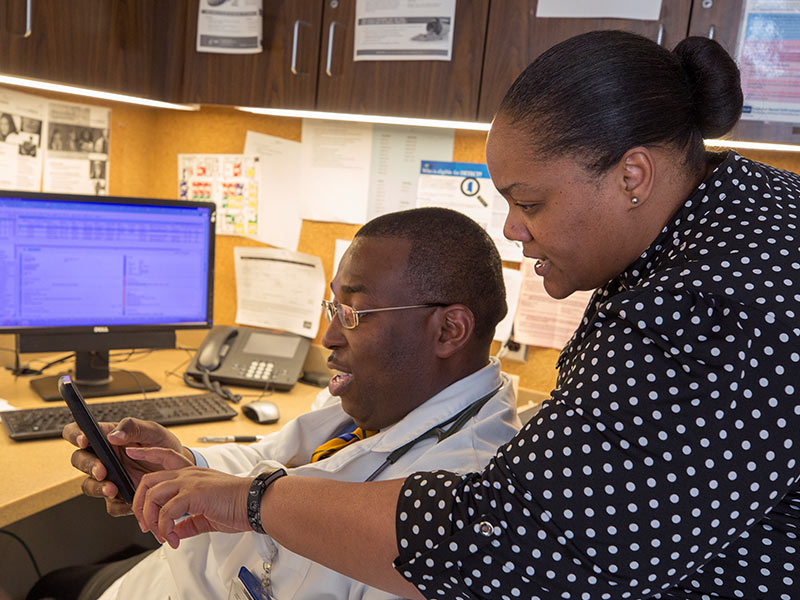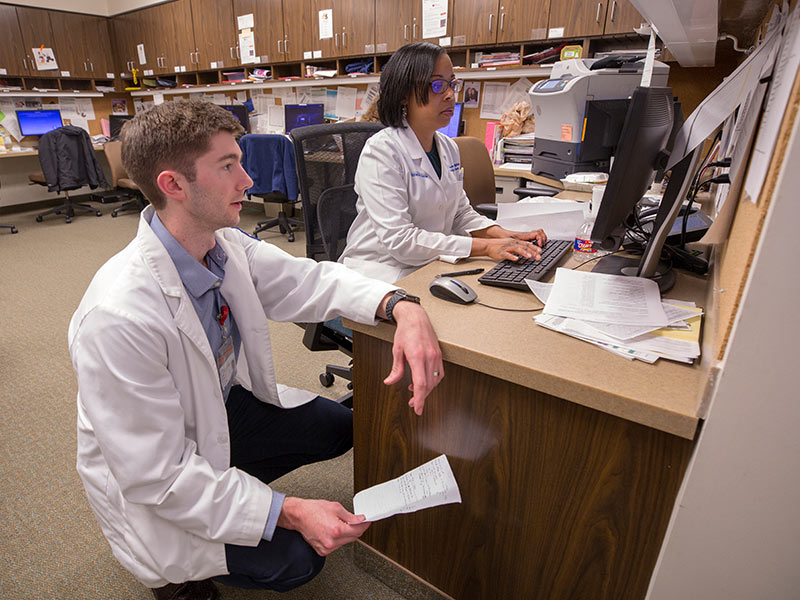Use of electronic records at UMMC to get smarter, faster, more Epic

When it comes to sizing up the performance of Epic, the University of Mississippi Medical Center’s electronic health record system, the answer lies in how well it’s utilized by whom.
“It’s what I like to call ‘The glass half full,’’’ said Dr. Shannon Pittman, professor and chair of the Department of Family Medicine. “Epic is a tool that we use to give care to our patients. Is it perfect? No. Is it a good tool? Yes. And, we have the chance to make it better.”
That process is underway as the Medical Center prepares for a major Epic upgrade this summer. It’s so much more than better software. It’s hefty new training for employees and improved functionality. It’s much-needed blending of the science of health care and the science of technology. So much so that it's been dubbed a "rebirth."

“When we went online six years ago, the training was mostly on the function of Epic,” said Dr. Paul Veregge, chief medical information officer and chief information officer. “This will be a real investment in people. Employees will be able to work faster and smarter.”
Now in its 2015 edition, the 2018 version will go live on July 22. The Medical Center pays about $3 million annually for Epic; the upgrade represents an additional $6.8 million commitment, Veregge said.
Epic isn’t just the repository of a patient’s treatment history. It’s used to schedule patient appointments and check in patients before they’re seen by providers, who input into Epic details from that visit or hospitalization. “It travels with you from visit to visit,” said Mary Craft, senior Epic program manager.
Epic’s rebirth is necessary because the ability to navigate electronic health information to its fullest extent is impacting patient care here in more ways than you might expect.
The 2018 upgrade is both special and different, Veregge said. As it’s rolled out, the Medical Center is asking employees to commit to doing what it takes to make it a success.
“It drives how we do things in the hospital,” Veregge said. “It’s the go-between between clinicians and the technical side. It also drives our revenue cycle. All of our clinical income comes through Epic.”
“We’re trying to have efficiencies for all providers, and having people understand how both sides drive the efficiencies,” Craft said.

The biggest reason for the upgrade, however, is simple: Epic is intrinsic to patient care.
“Patient safety is a real driver,” Veregge said. “We want to make continuous improvements in patient safety and quality of care, and we want to make improvements in population health management.”
The Epic upgrade consists of “add-ons” and other activities designed to increase employees’ knowledge and improve the patient experience. Among them:
- There will be a bigger people investment. Physicians, nurse educators and other clinicians will be certified as Epic trainers, and they will assist in training employees in how to use Epic tools to better perform their specific jobs.
- Ideas for the upgrade are being discussed by the Epic Physician Oversight Committee, chaired by Pittman with representatives from all academic departments, and the Epic Clinicians Oversight Committee, chaired by Craft, made up of non-physician health care staff such as nurses, physical therapists, respiratory therapists and pharmacists. They are the governing committees that make decisions on Epic enhancements and changes.
- Epic Rover will be piloted for nursing on several inpatient floors. Epic Rover allows bar code scanning, the viewing of patient lists, and the ability to complete certain tasks and to document in flow sheets on an iPhone. “It will be information in the palm of their hands,” Veregge said.
- Welcome kiosks in clinical areas will be piloted to allow patients to self-check in for an appointment. Eventually, that process will include a pilot of patients’ ability to sign forms related to their care through E-signature.
- A “tap and go” feature, to be piloted in the Emergency Department, will allow Epic users to use their badges to log in to their computers.
- A help desk staffed by experienced Epic clinicians will answer clinical questions. If the help desk is unable to resolve an issue quickly, the ticket created for the caller will be routed to the appropriate team for action.
- This month, sessions will be held with users to identify workflows that need to be addressed with the upgrade, including the need for re-training, Craft said.
“This is an opportunity to optimize the system, and we hope the upgrade will help us do that,” Pittman said. “My role is about provider engagement, but we should be thinking about everyone who interfaces with electronic medical records.”

Michelle Crawford, a registered nurse and abdominal transplant coordinator at UMMC Grenada’s transplant clinic, said she’s up for more Epic training. “Absolutely,” Crawford said. “There’s more I can do with Epic, I’m sure.”
Two of Epic’s current features greatly help her deliver good patient care. “One of my favorites is having Epic on your phone,” she said. “I can take a picture of a patient, and it goes straight into their chart. Doctors can see their photos, and when we check in a patient for testing, their picture comes up. It’s very personal.”
Epic also comes into play in the Medical Center’s new collaborative relationship with Vanderbilt University Medical Center. “A lot of my patients are on the transplant list at Vanderbilt, but they’re on ours, too,” Crawford said. “We can see their records from Vanderbilt now. That saves a lot of time.”
Pittman acknowledges some employees are skeptical about the upgrade. “They’re asking, ‘Will it be different? Is it just a lot of talk?’’’ she said. “We have not always done a great job surrounding the training part, and to meet people where their needs are. DIS is making a real effort to say to the end user, ‘What do you need?’
“It won’t be perfect, but we can ask the right questions and have people in the best place.”
To get ready for the upgrade, “we’ve had dozens of listening sessions to gather information on what employees do and don’t like,” Veregge said.
“We asked users what was their ‘Grrrrr’ moment with Epic,” Craft said. “There were a wide variety of answers: Can there be an easier way to view blood transfusions? What do I do with inbasket messages for a provider who is no longer here?”
Certified medical surgical nurse Gina Houpt spends most of her shift working with Epic to admit and discharge patients from 5 North. “Part of it is that the admissions navigators aren’t all in one place, and if they were, it would be easier,” she said. “Suicide risk isn’t in the same place as flu or pneumonia vaccines. We’d have better compliance if it was all in one spot.”
During the patient discharge process, “the doctor puts their information in, and we go back and put some of the same things in,” Houpt said. “If we could lessen the redundancy, it would save us time.”

Founded in 1979, Epic is one of the nation’s largest electronic health record systems, impacting 190 million patients. Analysts from Epic’s headquarters are augmenting the work of the Epic build team and assisting the Medical Center’s Epic analysts who are fine-tuning the upgrade. “It’s a good sounding board for changes we are making in the system for people who use Epic day to day,” Pittman said.
“This affords us access to some of the best practices in the nation,” Craft said. “We get those benefits from all of the other organizations.”
As training for the upgrade progresses, employees should see a difference – and they and their patients will reap the benefits.
“There are tons of ways that we can use this tool in a better way,” Pittman said. “Sometimes, it’s hard to build an airplane while you’re flying it. You find a way to get done what you need done. There’s not a good time to stop and say, ‘This workflow is broken.’’’
Said Veregge: “Epic is a tool. It’s the people who use it.”

